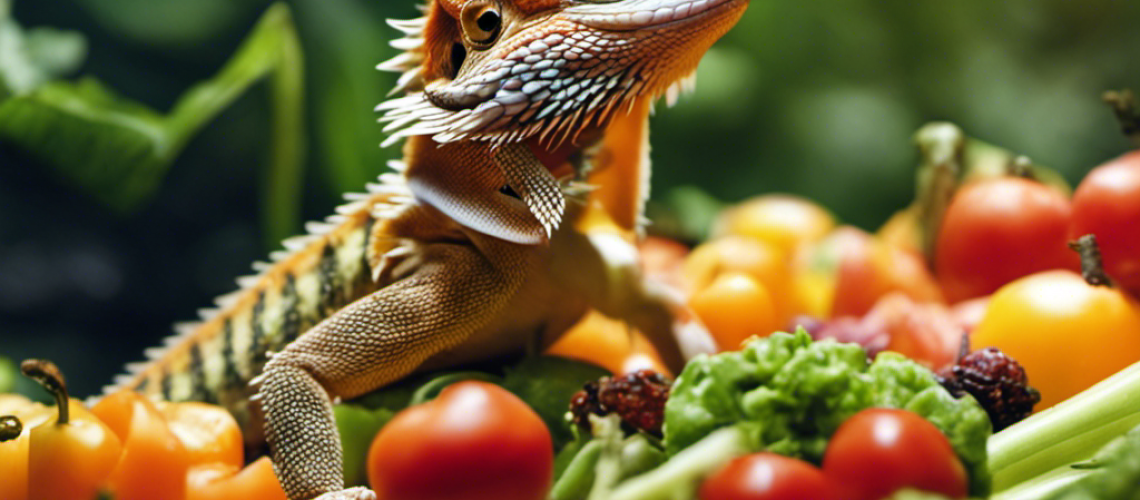Bearded dragons are popular pets due to their relatively low maintenance requirements and unique personalities.
One important aspect of caring for these animals is providing them with a balanced diet.
This article will discuss the various dietary components that can be included in a bearded dragon’s diet, such as vegetables, fruits, live insects, prepared diets, feeding frequency, and supplements.
Key Takeaways
- Collard greens, squash, bell peppers, and apples are essential vegetables and fruits for a bearded dragon’s balanced diet.
- Grubs, crickets, and commercially-sourced live insects provide necessary nutrition for bearded dragons.
- Prepared diets such as whole prey diets and commercially-prepared diets offer essential vitamins and minerals.
- Feeding frequency depends on the age and size of the bearded dragon, with juveniles being fed daily and adults every other day.
Vegetables and Fruits for Bearded Dragons
A variety of vegetables and fruits form a significant part of the diet for bearded dragons. They provide essential nutrients and promote digestive health, helping to ensure they meet their unique nutrient needs. Offerings may include collard greens, squash, bell peppers, apples, peaches, and more.
Preparing these items in a safe manner is important for providing balanced nutrition while also avoiding any potential risks. Variety is key to support overall wellbeing of a bearded dragon.
Live Insects for Bearded Dragons
Live insects are a necessary component of the dietary needs of bearded dragons. These creatures require an array of grubs, crickets, and other live insects to ensure proper nutrition.
While harvesting these from the wild is possible, it can be difficult to guarantee nutritional content or safety. Thus, commercially-sourced crickets and grubs are recommended for optimal nutrition and to avoid potential contaminants.
Supplementing with vitamins and minerals may also be needed for a balanced diet.
Prepared Diets for Bearded Dragons
Commercially-prepared diets are available as an alternative to live insects for providing nutrition to bearded dragons. A balanced diet consists of:
- Whole prey diets, such as crickets and mealworms: nutrient-dense and provide essential vitamins and minerals.
- Calcium-rich insects, like wax worms, superworms, or silkworms: offer calcium supplementation.
- Gut loading insects with healthy fruits and vegetables: boosts the nutritional value of the insect.
Providing a varied diet promotes optimal health in beardies while allowing them freedom of choice!
Feeding Frequency for Bearded Dragons
The frequency of feeding should be determined based on the age and size of the reptile. Juveniles should be fed daily while adults can be fed every other day, with small amounts at each mealtime. Gut loading is an essential part of a bearded dragon’s diet, as it provides a balance of vitamins necessary for their health. In addition, food items must also be dusted or sprayed with calcium and vitamin supplements to maintain proper nutrition. Apples, bananas, grapes, and most fruits are suitable treats that can also provide additional vitamins for balanced diets.
Supplements for Bearded Dragons
Supplementation is necessary to ensure adequate nutrition for bearded dragons. To meet their dietary needs, consider the following:
- Freezing Insects: Make sure they are gut loaded and dusted with calcium before feeding them.
- Calcium Sources: Offer calcium supplements, either as a powder or in liquid form.
- Vitamins & Supplements: Vitamin D3 and other minerals can be provided through supplements to ensure proper growth and health.
Frequently Asked Questions
What Are the Most Common Health Problems Associated With Bearded Dragons?
Bearded dragons can experience health problems due to calcium and vitamin deficiencies, such as metabolic bone disease, kidney and liver issues, stunted growth, and anorexia. These conditions are often caused by an improper diet or insufficient supplementation.
How Can I Tell if My Bearded Dragon Is Getting Enough Nutrients?
Signs of inadequate nutrition in bearded dragons can include vitamin deficiencies and digestive issues. It is important to monitor for changes in behavior, appetite, and energy levels that may indicate a need for dietary adjustment. Regular checkups with a veterinarian can help ensure your dragon is receiving sufficient nutrients.
What Should I Do if My Bearded Dragon Refuses to Eat?
If a bearded dragon refuses to eat, try offering healthy treats or rewards and socializing with the dragon regularly. This may help establish better eating habits. Additionally, monitor any changes in behavior that could indicate health issues.
How Often Should I Bathe My Bearded Dragon?
Bathing a bearded dragon should be done every 10-14 days, using lukewarm water (75-85°F). Allow the dragon to soak for up to 15 minutes. Monitor closely and ensure that your pet is comfortable throughout the process.
What Kind of Environment Does a Bearded Dragon Need to Be Healthy?
Bearded dragons require an environment that is conducive to their health; temperature regulation and substrate selection are important factors. To ensure proper heat, basking areas should be 80-90°F while the cooler side should remain in the 70’s. Substrate options should provide good drainage and allow for burrowing.
Conclusion
A balanced diet for a bearded dragon should include vegetables, fruits, live insects, prepared diets, and occasional supplements.
Vegetables such as kale, squash, and collard greens should be offered daily. Fruits can also be given occasionally.
Live insects like crickets or worms should be fed several times a week. Prepared diets are available in pellets or canned food but these should only make up a small portion of the diet.
Feeding frequency should depend on the age of the bearded dragon – hatchlings need to eat more frequently than adults do.
Lastly, calcium and vitamin D3 supplements may be necessary to ensure proper nutrition.
With careful attention to their dietary needs, you can help your beardie stay healthy and happy!






